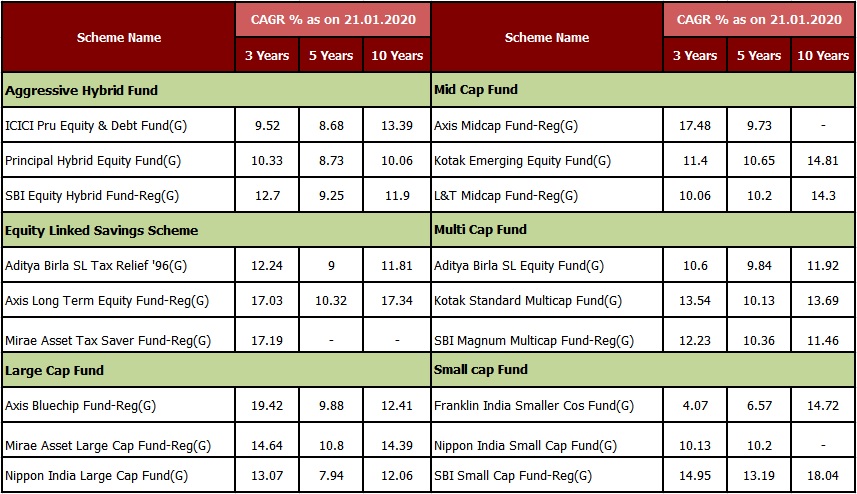 Before attempting to find an answer to the question “Why mutual funds?” we should first understand why we should invest. The straight answer is that investment will help us create wealth and wealth helps us in realizing our financial goals. Broadly, people save and investment to:
Before attempting to find an answer to the question “Why mutual funds?” we should first understand why we should invest. The straight answer is that investment will help us create wealth and wealth helps us in realizing our financial goals. Broadly, people save and investment to:
- To beat Inflation i.e. preserve existing wealth
- To fund future goals/needs
- To meet contingencies
- To maintain standard of living after retirement
Investing to beat inflation is a challenge for any investor. Inflation, in simple terms, is the rise in cost of living over time. If the investment is made with a purpose of meeting a long-term objective, for example retirement, and if the investor is not earning a return above the average rate of inflation on his/her investment, then the whole exercise would be meaningless. If the investment were made in a bank deposit, which gave a return of 7% per annum with inflation at 4%, then the real return from the investment would be only 3%. This may not be worrisome for a year or two but this will have great impact on long-term savings.
Education inflation is high in our country. If one spends Rs.50000 as school fee for a kid who is studying in first standard, then the same fee will be almost Rs. 1 lakh when he/she reaches 10th standard, at an inflation rate of 8%. Nobody can escape from inflation but there are clever ways to beat inflation. One of the best methods is to invest in mutual funds for long term.
Here are some advantages of mutual fund investments.
Diversified Portfolio
Mutual funds normally invest in two asset classes – debt and equity. Some funds invest in pure debt, some invest in equity only and some in both. Funds investing in both debt and equity are known as balanced funds or hybrid funds.
A major benefit of investing in a mutual fund is that one gets exposure to a variety of stocks and fixed income instruments. For example, if one invests Rs. 5,000 directly in stocks, he/she would probably get only a few shares. On the other hand, when he/she invests in a mutual fund, he/she would get a basket of several stocks representing different companies and various sectors. Here, the advantage is that if a particular stock doesn’t perform, the other stocks would compensate. Thus, mutual funds ensure diversification and risk reduction.
Affordability
In mutual funds one can invest small amounts. One can begin an SIP (Systematic Investment Plan, which is the regular investment option in mutual funds) with as little as Rs 500 a month. The advantage here is that the investor need not wait to accumulate enough amount to make big investments. In other words, an investor will be able to make optimum use of available cash and maximise returns. The expense for buying a fund is also negligible.
Professional expertise
Mostly, ordinary investors don’t have the expertise to identify and buy good stocks. Selecting individual stocks and other instruments involves lot of research and expertise. Expert fund managers identify winning stocks and decide when to buy them, and more importantly, when to sell them.
Probability of higher returns
Mutual funds, in the long-term, have the capability to deliver superior returns compared to other traditional investment options. Debt funds are good investment choices for investors with lower risk appetite. They have consistently beaten Fixed Deposit (FD) returns in the past. For those aggressive investors with high-risk appetite, equity/hybrid funds are great investment opportunities that can deliver superior returns with tax benefits.
Systematic Investment Plans
SIP (Systematic Investment Plan) is the most popular investment method for ordinary investors. SIPs allow investors to invest a fixed amount of money at regular intervals. SIPs also have the advantage of averaging the cost of units, besides providing benefits of compounding. For retail investors, the SIP route is the most effective investment method to achieve financial goals of life.
Performance of a few selected equity mutual funds scheme

The above mutual fund schemes, identified by Geojit’s Mutual fund research team, have been consistently performing for the last several years. There are many other schemes representing various categories in the mutual fund basket available for investors to choose from. Mutual funds are the simplest and hassle- free way of investing in capital market. As the table shows, long-term investment in mutual funds is ideal for wealth creation. So, invest and grow rich!









Can you recommend some mutual funds, which will assure a minimum 10% return?
Please click the below link for:
Equity Fund Recommendations: October 2019
Debt Fund Recommendations: October 2019
SIP Performance of Recommended Funds – October 2019
performance of SIPs in the past two to three years is not encouraging